小学一年级上英语语法-过去进行时
- 格式:doc
- 大小:23.50 KB
- 文档页数:2
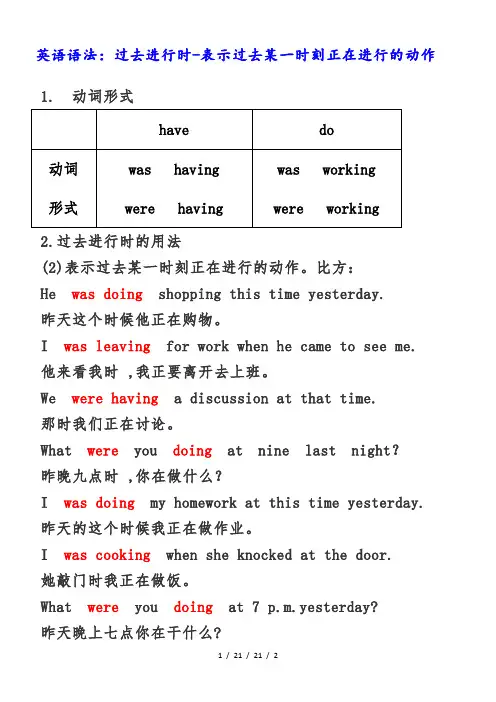
英语语法:过去进行时-表示过去某一时刻正在进行的动作1. 动词形式2.过去进行时的用法(2)表示过去某一时刻正在进行的动作。
比方:He was doing shopping this time yesterday.昨天这个时候他正在购物。
I was leaving for work when he came to see me.他来看我时 ,我正要离开去上班。
We were having a discussion at that time.那时我们正在讨论。
What were you doing at nine last night?昨晚九点时 ,你在做什么?I was doing my homework at this time yesterday.昨天的这个时候我正在做作业。
I was cooking when she knocked at the door.她敲门时我正在做饭。
What were you doing at 7 p.m.yesterday?昨天晚上七点你在干什么?一、选择填空。
1. She ___ to her university when a police car drove up beside her and made her stop.A. had drivenB. was drivingC. has drivenD. drove2. The schoolmaster ___badly behaved classes before he knew what to do with those problem students.A. has experiencedB. was experiencingC. would experienceD. had experienced参考答案:1-2: BD二、分析句子的语法结构 ,并译成中文。
1. he schoolmaster had experienced badly behaved classes before he knew what to do with those problem students.2. I know he’s baiting us to respond. I’m taking the bait in hopes that rational folks realize this is wrong and dangerous.【Newsweek】。
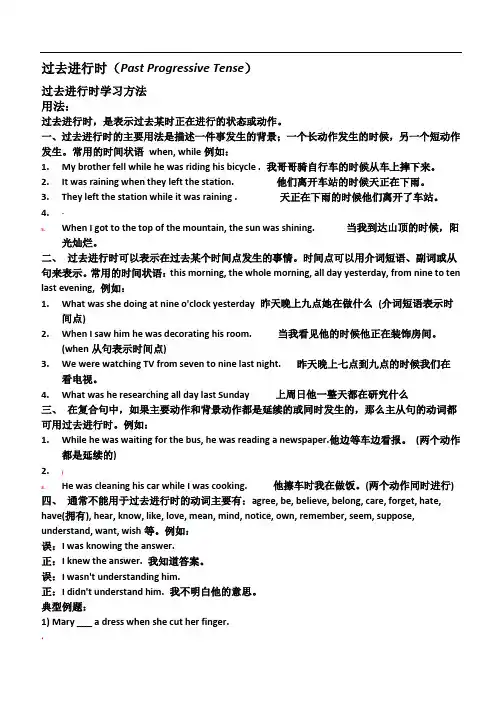
过去进行时(Past Progressive Tense)过去进行时学习方法用法:过去进行时,是表示过去某时正在进行的状态或动作。
一、过去进行时的主要用法是描述一件事发生的背景;一个长动作发生的时候,另一个短动作发生。
常用的时间状语when, while例如:1.My brother fell while he was riding his bicycle . 我哥哥骑自行车的时候从车上摔下来。
2.It was raining when they left the station. 他们离开车站的时候天正在下雨。
3.They left the station while it was raining . 天正在下雨的时候他们离开了车站。
4.~5.When I got to the top of the mountain, the sun was shining. 当我到达山顶的时候,阳光灿烂。
二、过去进行时可以表示在过去某个时间点发生的事情。
时间点可以用介词短语、副词或从句来表示。
常用的时间状语:this morning, the whole morning, all day yesterday, from nine to ten last evening, 例如:1.What was she doing at nine o'clock yesterday 昨天晚上九点她在做什么(介词短语表示时间点)2.When I saw him he was decorating his room. 当我看见他的时候他正在装饰房间。
(when从句表示时间点)3.We were watching TV from seven to nine last night. 昨天晚上七点到九点的时候我们在看电视。
4.What was he researching all day last Sunday 上周日他一整天都在研究什么三、在复合句中,如果主要动作和背景动作都是延续的或同时发生的,那么主从句的动词都可用过去进行时。
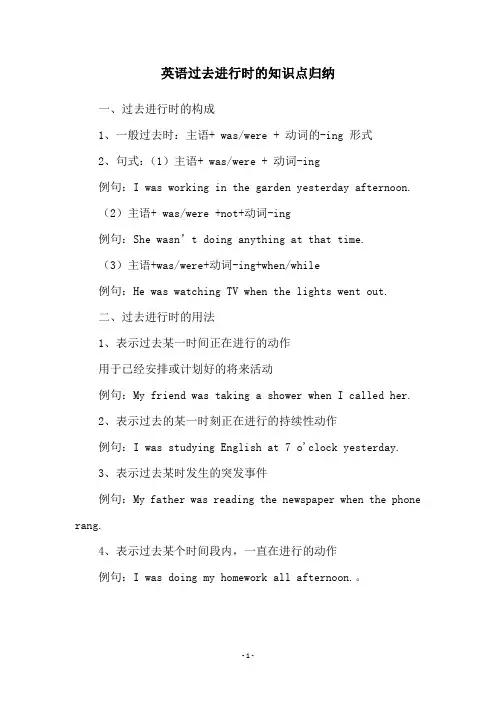
英语过去进行时的知识点归纳
一、过去进行时的构成
1、一般过去时:主语+ was/were + 动词的-ing 形式
2、句式:(1)主语+ was/were + 动词-ing
例句:I was working in the garden yesterday afternoon.
(2)主语+ was/were +not+动词-ing
例句:She wasn’t doing anything at that time.
(3)主语+was/were+动词-ing+when/while
例句:He was watching TV when the lights went out.
二、过去进行时的用法
1、表示过去某一时间正在进行的动作
用于已经安排或计划好的将来活动
例句:My friend was taking a shower when I called her.
2、表示过去的某一时刻正在进行的持续性动作
例句:I was studying English at 7 o'clock yesterday.
3、表示过去某时发生的突发事件
例句:My father was reading the newspaper when the phone rang.
4、表示过去某个时间段内,一直在进行的动作
例句:I was doing my homework all afternoon.。
- 1 -。
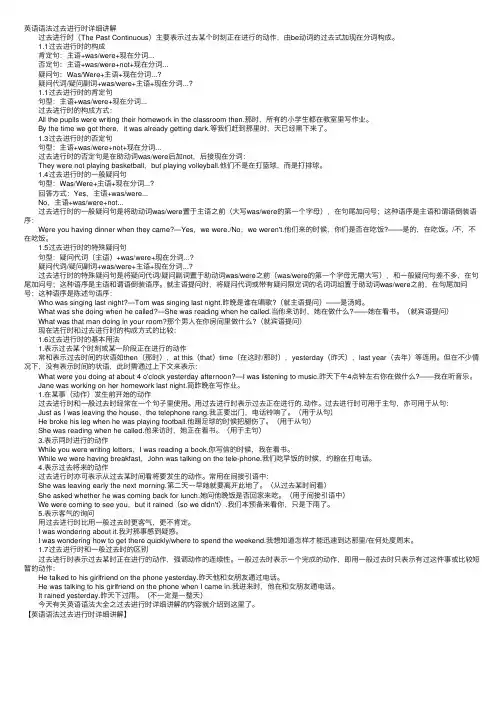
英语语法过去进⾏时详细讲解 过去进⾏时(The Past Continuous)主要表⽰过去某个时刻正在进⾏的动作,由be动词的过去式加现在分词构成。
1.1过去进⾏时的构成 肯定句:主语+was/were+现在分词... 否定句:主语+was/were+not+现在分词... 疑问句:Was/Were+主语+现在分词...? 疑问代词/疑问副词+was/were+主语+现在分词...? 1.1过去进⾏时的肯定句 句型:主语+was/were+现在分词... 过去进⾏时的构成⽅式: All the pupils were writing their homework in the classroom then.那时,所有的⼩学⽣都在教室⾥写作业。
By the time we got there,it was already getting dark.等我们赶到那⾥时,天已经⿊下来了。
1.3过去进⾏时的否定句 句型:主语+was/were+not+现在分词... 过去进⾏时的否定句是在助动词was/were后加not,后接现在分词: They were not playing basketball,but playing volleyball.他们不是在打篮球,⽽是打排球。
1.4过去进⾏时的⼀般疑问句 句型:Was/Were+主语+现在分词...? 回答⽅式:Yes,主语+was/were... No,主语+was/were+not... 过去进⾏时的⼀般疑问句是将助动词was/were置于主语之前(⼤写was/were的第⼀个字母),在句尾加问号;这种语序是主语和谓语倒装语序: Were you having dinner when they came?—Yes,we were./No,we weren't.他们来的时候,你们是否在吃饭?——是的,在吃饭。
/不,不在吃饭。
1.5过去进⾏时的特殊疑问句 句型:疑问代词(主语)+was/were+现在分词...? 疑问代词/疑问副词+was/were+主语+现在分词...? 过去进⾏时的特殊疑问句是将疑问代词/疑问副词置于助动词was/were之前(was/were的第⼀个字母⽆需⼤写),和⼀般疑问句差不多,在句尾加问号;这种语序是主语和谓语倒装语序。
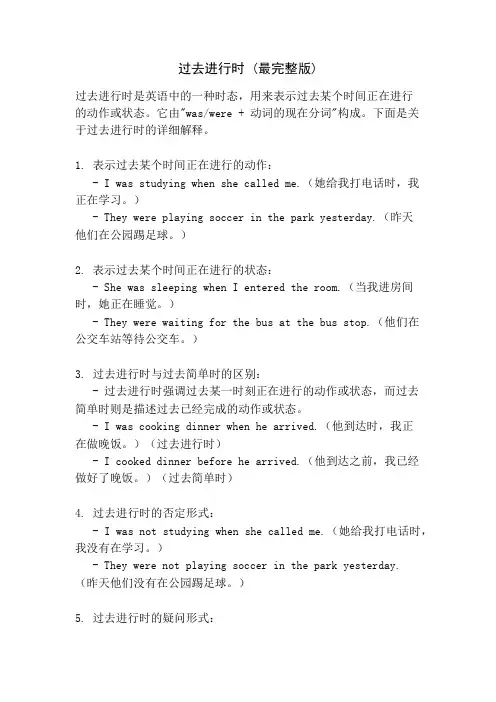
过去进行时 (最完整版)过去进行时是英语中的一种时态,用来表示过去某个时间正在进行的动作或状态。
它由"was/were + 动词的现在分词"构成。
下面是关于过去进行时的详细解释。
1. 表示过去某个时间正在进行的动作:- I was studying when she called me.(她给我打电话时,我正在学习。
)- They were playing soccer in the park yesterday.(昨天他们在公园踢足球。
)2. 表示过去某个时间正在进行的状态:- She was sleeping when I entered the room.(当我进房间时,她正在睡觉。
)- They were waiting for the bus at the bus stop.(他们在公交车站等待公交车。
)3. 过去进行时与过去简单时的区别:- 过去进行时强调过去某一时刻正在进行的动作或状态,而过去简单时则是描述过去已经完成的动作或状态。
- I was cooking dinner when he arrived.(他到达时,我正在做晚饭。
)(过去进行时)- I cooked dinner before he arrived.(他到达之前,我已经做好了晚饭。
)(过去简单时)4. 过去进行时的否定形式:- I was not studying when she called me.(她给我打电话时,我没有在学习。
)- They were not playing soccer in the park yesterday.(昨天他们没有在公园踢足球。
)5. 过去进行时的疑问形式:- Was she sleeping when I entered the room?(当我进房间时,她正在睡觉吗?)- Were they waiting for the bus at the bus stop?(他们在公交车站等待公交车吗?)需要注意的是,过去进行时通常与另一个过去的动作或事件同时发生。
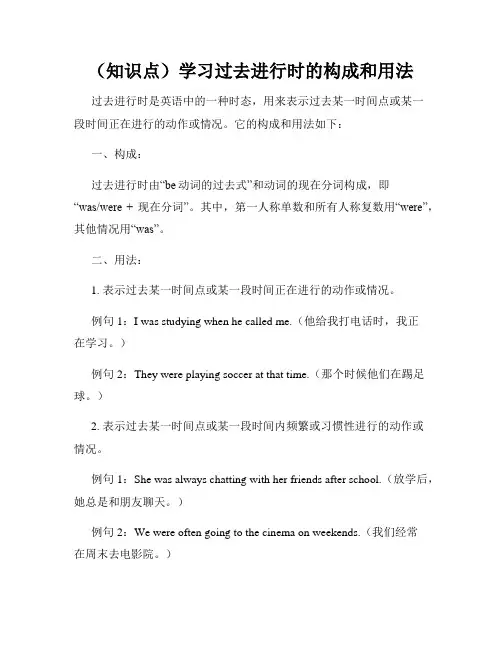
(知识点)学习过去进行时的构成和用法过去进行时是英语中的一种时态,用来表示过去某一时间点或某一段时间正在进行的动作或情况。
它的构成和用法如下:一、构成:过去进行时由“be动词的过去式”和动词的现在分词构成,即“was/were + 现在分词”。
其中,第一人称单数和所有人称复数用“were”,其他情况用“was”。
二、用法:1. 表示过去某一时间点或某一段时间正在进行的动作或情况。
例句1:I was studying when he called me.(他给我打电话时,我正在学习。
)例句2:They were playing soccer at that time.(那个时候他们在踢足球。
)2. 表示过去某一时间点或某一段时间内频繁或习惯性进行的动作或情况。
例句1:She was always chatting with her friends after school.(放学后,她总是和朋友聊天。
)例句2:We were often going to the cinema on weekends.(我们经常在周末去电影院。
)3. 用来修饰主句中的过去某一时刻的动作或状态。
例句1:When they arrived, it was raining heavily.(当他们到达时,正下着大雨。
)例句2:I was reading a book when the doorbell rang.(门铃响的时候,我正在读书。
)4. 用于虚拟语气中,表示对过去的猜测或假设。
例句1:If I were studying harder, I would have passed the exam.(如果我当时学得更用心,我就能通过考试了。
)例句2:I wish I were traveling around the world.(但愿我当时正在周游世界。
)5. 用于间接引语中,表示说话时的时间点或情况。
例句:He told me that he was driving home when the accident happened.(他告诉我他在事故发生时正在开车回家。
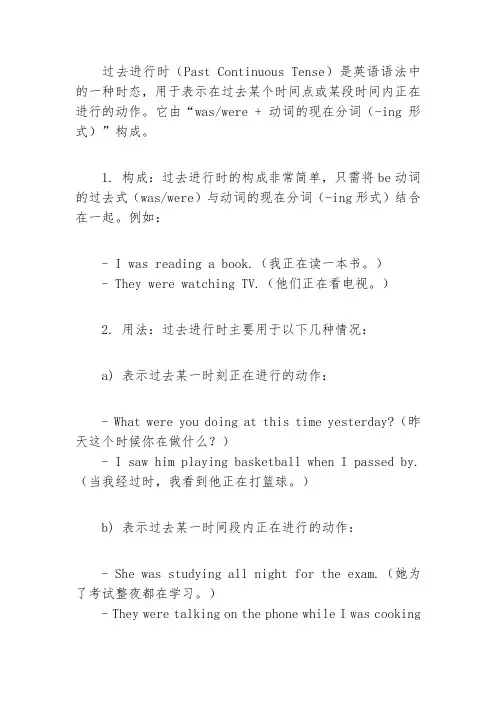
过去进行时(Past Continuous Tense)是英语语法中的一种时态,用于表示在过去某个时间点或某段时间内正在进行的动作。
它由“was/were + 动词的现在分词(-ing形式)”构成。
1. 构成:过去进行时的构成非常简单,只需将be动词的过去式(was/were)与动词的现在分词(-ing形式)结合在一起。
例如:- I was reading a book.(我正在读一本书。
)- They were watching TV.(他们正在看电视。
)2. 用法:过去进行时主要用于以下几种情况:a) 表示过去某一时刻正在进行的动作:- What were you doing at this time yesterday?(昨天这个时候你在做什么?)- I saw him playing basketball when I passed by.(当我经过时,我看到他正在打篮球。
)b) 表示过去某一时间段内正在进行的动作:- She was studying all night for the exam.(她为了考试整夜都在学习。
)- They were talking on the phone while I was cookingdinner.(我在做晚饭的时候,他们在打电话。
)c) 表示过去某一动作发生的背景或同时发生的另一个动作:- He was listening to music while he was working.(他在工作时听音乐。
)- She was reading a magazine when the phone rang.(电话响的时候,她正在看杂志。
)3. 注意事项:a) 当表示过去某一时刻正在进行的动作时,通常与表示过去的时间状语连用,如yesterday, last night, in 1990等。
b) 当表示过去某一时间段内正在进行的动作时,通常与表示过去的时间状语连用,如from 7 to 9 last night, all day yesterday等。
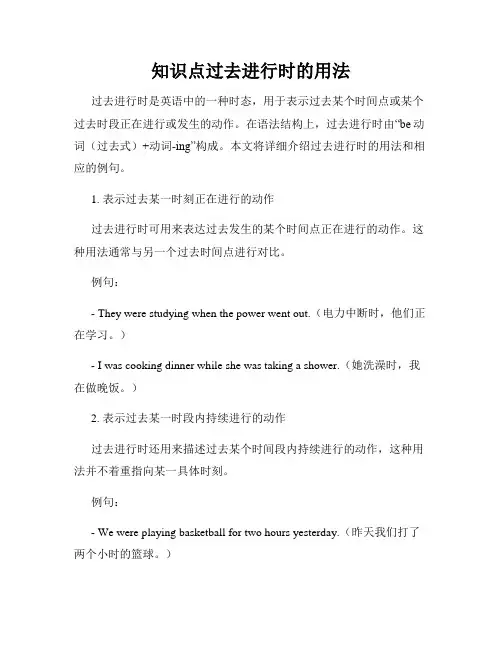
知识点过去进行时的用法过去进行时是英语中的一种时态,用于表示过去某个时间点或某个过去时段正在进行或发生的动作。
在语法结构上,过去进行时由“be动词(过去式)+动词-ing”构成。
本文将详细介绍过去进行时的用法和相应的例句。
1. 表示过去某一时刻正在进行的动作过去进行时可用来表达过去发生的某个时间点正在进行的动作。
这种用法通常与另一个过去时间点进行对比。
例句:- They were studying when the power went out.(电力中断时,他们正在学习。
)- I was cooking dinner while she was taking a shower.(她洗澡时,我在做晚饭。
)2. 表示过去某一时段内持续进行的动作过去进行时还用来描述过去某个时间段内持续进行的动作,这种用法并不着重指向某一具体时刻。
例句:- We were playing basketball for two hours yesterday.(昨天我们打了两个小时的篮球。
)- He was reading a book all evening.(他整晚都在读书。
)3. 表示过去某个时间点的背景动作过去进行时可以用于描述过去的某个时间点,强调其背景下正在进行的动作。
这种用法常常与一般过去时连用,用来提供更完整的背景信息。
例句:- When I arrived at the party, everyone was dancing.(当我到达晚会时,大家都在跳舞。
)- The phone rang while she was having a meeting.(她开会的时候电话响了。
)4. 表示过去愿望和计划过去进行时还可以表达过去的愿望和计划,表示当时的期望或打算。
例句:- I was hoping to visit Paris, but I couldn't afford the trip.(当时我希望能去巴黎,但是支付不起旅费。
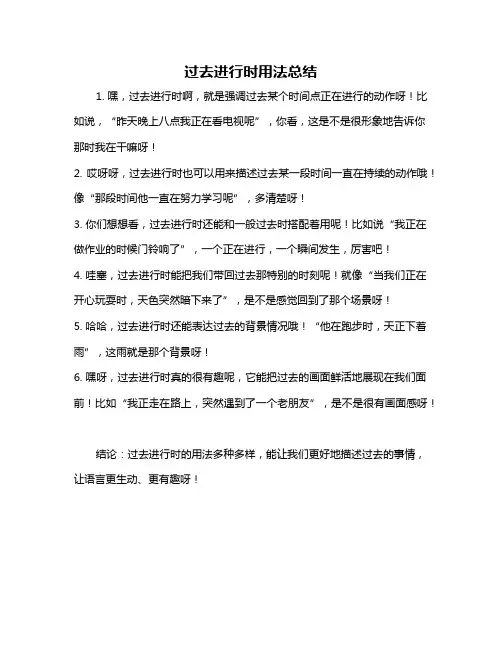
过去进行时用法总结
1. 嘿,过去进行时啊,就是强调过去某个时间点正在进行的动作呀!比如说,“昨天晚上八点我正在看电视呢”,你看,这是不是很形象地告诉你那时我在干嘛呀!
2. 哎呀呀,过去进行时也可以用来描述过去某一段时间一直在持续的动作哦!像“那段时间他一直在努力学习呢”,多清楚呀!
3. 你们想想看,过去进行时还能和一般过去时搭配着用呢!比如说“我正在做作业的时候门铃响了”,一个正在进行,一个瞬间发生,厉害吧!
4. 哇塞,过去进行时能把我们带回过去那特别的时刻呢!就像“当我们正在开心玩耍时,天色突然暗下来了”,是不是感觉回到了那个场景呀!
5. 哈哈,过去进行时还能表达过去的背景情况哦!“他在跑步时,天正下着雨”,这雨就是那个背景呀!
6. 嘿呀,过去进行时真的很有趣呢,它能把过去的画面鲜活地展现在我们面前!比如“我正走在路上,突然遇到了一个老朋友”,是不是很有画面感呀!
结论:过去进行时的用法多种多样,能让我们更好地描述过去的事情,让语言更生动、更有趣呀!。
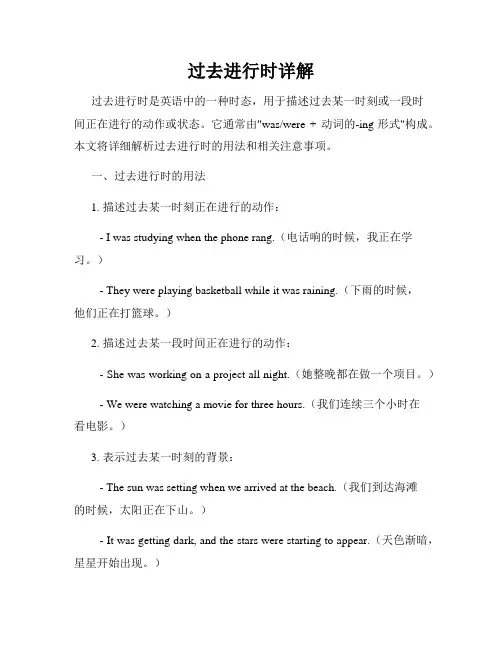
过去进行时详解过去进行时是英语中的一种时态,用于描述过去某一时刻或一段时间正在进行的动作或状态。
它通常由"was/were + 动词的-ing形式"构成。
本文将详细解析过去进行时的用法和相关注意事项。
一、过去进行时的用法1. 描述过去某一时刻正在进行的动作:- I was studying when the phone rang.(电话响的时候,我正在学习。
)- They were playing basketball while it was raining.(下雨的时候,他们正在打篮球。
)2. 描述过去某一段时间正在进行的动作:- She was working on a project all night.(她整晚都在做一个项目。
) - We were watching a movie for three hours.(我们连续三个小时在看电影。
)3. 表示过去某一时刻的背景:- The sun was setting when we arrived at the beach.(我们到达海滩的时候,太阳正在下山。
)- It was getting dark, and the stars were starting to appear.(天色渐暗,星星开始出现。
)4. 表示与过去某时刻相比较的延续性动作:- She was getting stronger every day.(她每天都在变得越来越强壮。
)- The company's profits were increasing steadily.(公司的利润稳步增长。
)二、过去进行时的注意事项1. 过去进行时通常与表示过去的时间状语连用,如yesterday(昨天)、last night(昨晚)等。
- They were having dinner last night when I called them.(昨晚我给他们打电话的时候,他们正在吃晚饭。
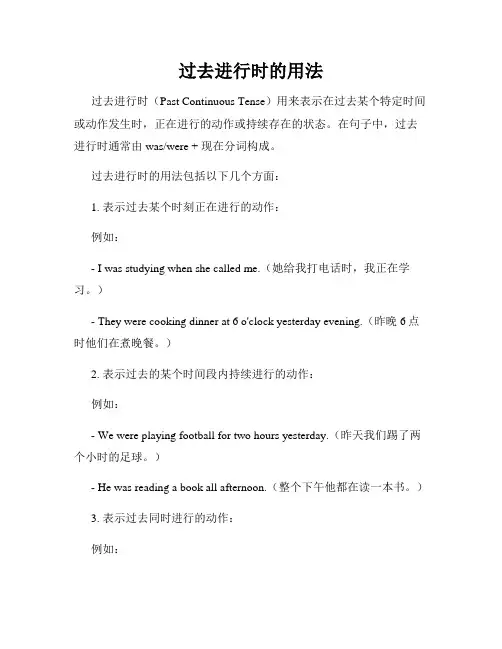
过去进行时的用法过去进行时(Past Continuous Tense)用来表示在过去某个特定时间或动作发生时,正在进行的动作或持续存在的状态。
在句子中,过去进行时通常由was/were + 现在分词构成。
过去进行时的用法包括以下几个方面:1. 表示过去某个时刻正在进行的动作:例如:- I was studying when she called me.(她给我打电话时,我正在学习。
)- They were cooking dinner at 6 o'clock yesterday evening.(昨晚6点时他们在煮晚餐。
)2. 表示过去的某个时间段内持续进行的动作:例如:- We were playing football for two hours yesterday.(昨天我们踢了两个小时的足球。
)- He was reading a book all afternoon.(整个下午他都在读一本书。
)3. 表示过去同时进行的动作:例如:- While she was cooking, he was watching TV.(当她在做饭时,他在看电视。
)- I was listening to music while I was doing my homework.(我在做作业的同时听音乐。
)4. 表示过去计划或安排好要发生的动作:例如:- They were going to the beach tomorrow.(他们计划明天去海滩。
)- She was going to visit her grandparents during summer vacation.(她打算暑假期间探望她的祖父母。
)需要注意的是,过去进行时通常用来描述过去的背景环境或过程,或者用来描述过去计划或安排好的事情。
对于在过去的某个时刻突然发生的动作,我们通常使用过去完成时(Past Perfect Tense)。
过去进行时的用法及常见句型总结过去进行时是英语中的一个时态,用来表示在过去某个时间点或某个过去的事件发生时,正在进行的动作或情况。
本文将总结过去进行时的用法,并提供一些常见的句型。
一、过去进行时的用法:1. 表示过去某个时间点或某个过去的事件发生时正在进行的动作或情况。
例如:- I was studying when she called me. (她打电话给我时我正在学习。
)- They were having dinner at 8 o'clock yesterday. (昨天8点他们正在吃晚饭。
)2. 表示过去某个时间段内一直进行的动作或情况。
例如:- He was working in the company from 2010 to 2015. (他从2010年到2015年一直在公司工作。
)- We were traveling around Europe last summer. (去年夏天我们一直在欧洲旅行。
)3. 表示过去的计划或安排。
例如:- We were supposed to meet at the café, but he didn't show up. (我们原本约好在咖啡馆见面,但他没有出现。
)- They were going to watch a movie together, but it was canceled. (他们原本打算一起看电影,不过电影被取消了。
)二、常见句型:1. 肯定句:主语 + was/were + 现在分词 + ...例如:- She was dancing at the party.- They were playing football in the park.2. 否定句:主语 + was not/were not + 现在分词 + ...或主语 + wasn't/weren't + 现在分词 + ...例如:- He was not working late last night.- We weren't watching TV when the accident happened.3. 疑问句:Was/Were + 主语 + 现在分词 + ...?例如:- Were you studying when I called you?- Was he playing the guitar at that time?4. 特殊疑问句:特殊疑问词 + was/were + 主语 + 现在分词 + ...?例如:- What were you doing when the power went out?- Where were they going when you saw them?5. 状语从句:when/while/as/though/while等连词 + 主语 + was/were + 现在分词 + ...例如:- She was writing an email when the phone rang.- We were eating dinner as the storm started.6. 陈述句的转述:Someone said that + 主语 + was/were + 现在分词 + ...例如:- Someone said that he was working on a new project.- They told me that you were singing beautifully.三、注意事项:1. 过去进行时经常与表示过去的时间状语连用,如yesterday(昨天)、last night(昨晚)等。
过去进行时知识点归纳过去进行时是英语语法中的一种时态,用于表示过去某个特定时间正在发生的动作或者状态。
本文将对过去进行时的用法、构成和注意事项进行详细的归纳总结。
过去进行时的构成十分简单,只需将“主语 + was/were + 动词的现在分词”这种形式即可。
例如:They were playing football at this time yesterday.(昨天这个时候他们正在踢足球)过去进行时通常用于描述过去某个特定时间点正在进行的动作,常常与表示时间点的词语或者短语连用,比如at this time yesterday, at 7o'clock last night等等。
例如:I was watching TV when she called me.(她给我打电话的时候,我正在看电视)过去进行时还可以用于表示过去同一时间段内经常反复发生的动作。
例如:He was always talking during class.(他上课的时候总是在说话)需要注意的是,过去进行时有时候也可以表示与过去某个时间点相伴的持续状态。
例如:Last night at 8 o'clock, the children were sleeping soundly in their beds.(昨晚8点,孩子们正在床上安稳地睡觉)在使用过去进行时时,还需要留意一些特殊的情况。
比如在表示感觉动词(如see, hear, taste等)或者状态动词(如be, seem, look等)时,常常不使用进行时态,而是用一般过去时。
例如:I heard a strangenoise when I was walking home last night.(昨晚在我走回家的路上,我听到了一种奇怪的声音)总的来说,过去进行时是表达过去某一时刻正在进行的动作或状态的时态,在英语语法中占有重要的地位。
希望本文能够帮助读者更好地理解和掌握过去进行时的用法和构成。
英语语法什么是过去进行时过去进行时是英语中的一种时态,用来描述过去某个时间点或时间段正在进行的动作或状态。
它通常由“was/were + 现在分词”构成。
在本文中,我将详细介绍过去进行时的用法、结构、常见例句以及注意事项。
一、过去进行时的用法:过去进行时表示在过去某个时间点或时间段正在进行的动作或状态。
它强调了过去某个时刻的持续性。
过去进行时通常用来描述以下情况:1. 过去某个时间点的持续动作:- I was studying when she called me.(她给我打电话时,我正在学习。
)- They were playing soccer at 3 p.m. yesterday.(昨天下午3点他们在踢足球。
)2. 过去某个时间段的持续状态:- She was living in Paris for two years.(她在巴黎住了两年。
)- We were working on the project all day yesterday.(昨天整天我们都在做这个项目。
)3. 过去的计划或安排:- They were going to the party, but it was canceled.(他们本想去参加派对,但是派对取消了。
)- I was meeting my friend for lunch, but he got sick.(我本来要和朋友吃午饭,但是他病了。
)4. 过去的态度或感受:- She was loving every minute of her vacation.(她度假的每一分钟都很享受。
)- They were hating the rainy weather.(他们讨厌那阴雨连绵的天气。
)二、过去进行时的结构:过去进行时的结构由“was/were + 现在分词”构成。
下面是各种人称和数的过去进行时的构成:1. 肯定句结构:- I was studying.- You were working.- He/she/it was sleeping.- We/you/they were playing.2. 否定句结构:- I was not studying.- You were not working.- He/she/it was not sleeping.- We/you/they were not playing.3. 疑问句结构:- Was I studying?- Were you working?- Was he/she/it sleeping?- Were we/you/they playing?4. 疑问句的否定回答:- Yes, I was./No, I wasn't.- Yes, you were./No, you weren't.- Yes, he/she/it was./No, he/she/it wasn't.- Yes, we/you/they were./No, we/you/they weren't.三、过去进行时的常见例句:下面是一些常见的过去进行时的例句,以帮助你更好地理解其用法和结构:1. They were watching a movie when I arrived.(我到达时,他们正在看电影。
过去进行时态讲解及练习过去进行时态,也称为过去进行时,是英语中用来描述在过去某一时间点或期间正在进行的动作或事件的时态。
它常常用来强调过去某个特定时刻正在发生的动作。
构成:过去进行时态的构成主要由两个部分组成:was/were + 动词的现在分词(-ing形式)。
用法:1. 表示过去某个指定时刻正在进行的动作或事件:Examples:- 昨天下午四点,我正在做作业。
Yesterday afternoon at four o'clock, I was doing my homework.- 他们在大雨中走在回家的路上。
They were walking home in the heavy rain.- 我们昨晚八点正在观看电影。
We were watching a movie at 8 p.m. last night.2. 表示过去某个时间段内一直在进行的动作或事件:Examples:- 他昨天整天都在打扫房间。
He was cleaning the room all day yesterday.- 我们在下雨时一直等待公交车。
We were waiting for the bus in the rain.练:根据句子的意思,用动词的适当形式填空,完成下面的练。
1. They ___________(play) basketball when it started to rain.2. What _________(you/do) at this time last night?3. She ___________(study) in the library when I saw her.4. Yesterday, we ___________(have) dinner when the power went out.5. He ___________(watch) TV when his mom called him.参考答案:1. were playing2. were you doing3. was studying4. were having5. was watching以上是过去进行时态的讲解及练,希望对你有所帮助!。
过去进行时1.概念:表示过去某段时间或某一时刻正在发生或进行的行为或动作;2.时间状语:at this time yesterday, at that time或以when引导的谓语动词是一般过去时的时间状语等;yesterday ,last ,ago, before, in+年或月,on+日, just now或者a moment ago3.基本结构:was/were+doing4.否定形式:was/were + not + doing.5.一般疑问句:把was或were放于句首;主要表示在过去的某个时间点上正在发生、进行的动作;由于它的定义是表示在过去的某个时间点上正在发生、进行的动作,所以,句子常带有一个表示“过去某个时间点”的状语;这个状语可能是短语,词组,或是一个从句;也可能是通过上下文来表达这层意思;过去进行时主要用于下面的情景中:1表示在过去某时刻正在进行的动作,例如:At this moment yesterday, I was packing for camp.昨天这个时候,我正在收拾东西去露营;When I came to see her last time, she was writing an article.上次我来看她的时候,她正在写一篇文章;What were you doing at eight last night 昨晚八点钟你在做什么2用于故事的开头,交代故事发生的背景情况;过去进行时所描述的动作是“正在进行”,所以,在这种情景中用“过去进行时”可以给读者一种“动感”,从而能使文章更加生动活泼;例如:One night, he was typing in his study . Suddenly , a man broke into his house and cut off the electricity … .一天晚上,他正在书房里打字;突然,一个人闯进屋来,切断了电源……3仅限少数动词表示在过去的未来时间要发生的动作;例如:When National Day was coming near , they began to make a plan for the holiday .国庆节即将来临的时候,他们开始制订度假计划;She told me that she was going to Hainan for her holiday. 她告诉我她将去海南度假;My friend said to me that he was lunching with one of his customers that day .我朋友对我说,他今天要与他的一位客户一块儿吃午饭;We left there when it's getting dark. 天快黑的时候,我们离开了那儿;6.用过去进行时表示现在,主要是为了使语气委婉、客气;如:I was wondering if you could give me a lift. 我不知你能否让我搭一下车;We were hoping you would stay with us. 我们很希望你能跟我们住在一起;How much did you want to spend, sir 先生,您打算花多少钱注:一般过去时也有类似用法,但比较而言,用过去进行时显得更客气,更不肯定;过去进行时练习题一、用动词的适当形式填空1. While we __________ wait for the bus, a girl __________ run up to us.2. I __________ telephone a friend when Bob __________ come in.3. Jim __________ jump on the bus as it __________ move away.4. We __________ test the new machine when the electricity ________go off.5. She _____ not want to stay in bed while the others _____ all, work in the fields.6. While mother ________ put Cathy to bed, the door bell ________ ring.7. As I __________ walk in the park, it __________ begin to rain.8. Even when she ___________ be a child she ________________ already, think of becoming a ballerina 芭蕾舞演员.9. It was quite late at night. George __________ read and Amy __________ ply her needle when they __________ hear a knock at the door.10. There __________ be a group round the fire when they __________ reach it. An old woman __________ sit on the ground near the kettle; two small children __________ lie near her; a donkey __________ bend his head overa tall girl.11. I _____ have my breakfast at half past six yesterday morning.12. Mary _____ go over her lessons from six to seven last night. John and peter ____do the same thing.13. What _____ you ___ do at that time We _____ watch TV.14. Was your father at home yesterday evening Yes ,he was. He _____ listen to the radio.15. They _____not make a model ship when I saw him.16. _____ they ____ have a meeting at 4 yesterday afternoonNo, they _____. They _____ clean the classroom.17. ______ it ______rain when you left school Yes, it ____. No, it ____18. What _____ your father _____ do when he was your age19. One day, Edison _____ wait for a train to arrive, and suddenly a little boy ran to the track轨道 to play.20. He asked me if I ______ go fishing that afternoon.21. The three of them were in a hurry because their plane _____ leave in five minutes.22. In a letter, john told us that he _____ come to china next month.23. When the bell rang, jenny _____ wait in her seat.24. She _____ make her dress the whole afternoon.25. While my father ____ look through the evening paper, he suddenly ____ a cry.26. When I ____ come in the room, he ____ see me, for he ____ read something27. When we _____ arrive at the village, it _____ get dark and it _____ rain hard.28. I _____ know you ____wait for me here.29. One day a little monkey ____play in a tall tree. A mother crocodile 鳄鱼 ____ look for food near the bank.30. What ____ your father ____ do yesterday evening He ____ study at the evening school.31. Later his parents found that he _____ sit on some eggs.32. When he knocked at the door, my aunt ____ cook33. The students ______ sing and ____ dance happily on the playground at that time.34. I ____ write a letter when the door bell rang.35. We had no classed at that time. We ____ plant trees.二、选择题1.I ______ cooked a meal when you _____ me.a. cooked, were ringingb. was cooking, rangc. was cooking, were ringingd. cooked, rang2.He said he _____ to draw a plane on the blackboard at that time.a. triesb. triedc. was tryingd. will try3.While she ______ TV, she ______ a sound outside the room.a. was watching, was hearingb. watched, was hearingc. watched, heardd. was watching, heard4.They _____ a football game from 7 to 9 last night.a. were watchingb. watchc. watchedd. are watching5.What book ____ you ______ when I ____ you at four yesterday afternoona. did, read, was seeingb. did, read, sawc. were, reading, sawd. were, reading, was seeing6.It was Friday evening. Mr and Mrs. Green _____ ready to fly to England.a. are gettingb. getc. were gettingd. got7.Lei Feng _____ always _____ of others when he ______ in the army.a. is, thinking, wasb. was, thinking, isc. did, think, isd. was, thinking, was8.A girl ______ my pen fall off the table when she _____ me. a. saw, passed b. was seeing, passed c. was seeing, passed d. was seeing, was passing9.We ____ for tom at ten last Sunday. He often kept us ______.a. were waiting, waitingb. were waiting, waitc. waited, waitingd. waited, wait10.He ____ his father on the farm the whole afternoon last Saturday.a. helpsb. would helpc. was helpingd. ishelping11.While mother _______ some washing, I _____ a kite for Kate.a. did, madeb. was doing, madec. was doing, was makingd. did,was making12."_______ you angry then " "they ______ too much noise."a. are, were makingb. were, were makingc. are, maded. were,made13.He ____ some cooking at that time, so _____ mea. did, heardb. did, didn't hearc. was doing, heardd. was doing,didn't hear14.This time yesterday jack _____ his bike. He _____ TVa. repaired, didn't watchb. was repairing, watchedc. repaired, watchedd. was repairing, wasn't watching15.His parents wanted to know how he _____ on with his new classmates.a. was gettingb. getsc. is gettingd. will get练习㈠用所给动词的正确形式填空;1.Jim _____write a letter at that moment.2.When the telephone _______ring,she ______do her homework.3.When I ______leave the part,the people ______enjoy themselves.4.______ they______ feed the animals at 5:00 yesterday afternoon5. Mrs.Green _____ _____ not wash clothes at this time yesterday.6. Grandpa ______ ______ mend his clock when I reached home.7.As I _____ walk in the park, I saw some children playing games.㈡、单选1 What ______ from three to four yesterday afternoonA have you doneB had you doneC did you doD were you doing2 – I call you yesterday evening, but there was no answer.- Oh., I’m sorry I _____ dinner at my friend’s home.A homeB hadC was havingD have had3 My mother _____ while my father _____TV.A cooked; was watchingB was cooking; was watchingC was cooked; watchedD cooked; watched4 When I got home, my son _____ the music.A am listening toB listened toC was listening toD was listening5 We heard a cry when we ______ TV last night.A were watchingB would watchC watchD watched6 Could you tell me when ______A she is comingB she was comingC will be comeD is he coming7 The teacher ______ when I came into the classroom.A is drawingB drawsC has drawnD was drawing8 Nobody noticed what she ______ at the moment.A will doB was doingC has doneD had done9 Was it raining hard when you _____ this morningA l过去进行时练习一、用动词的适当形式填空;1.I ___________ have my breakfast at half past six yesterday morning.2.Mary _____________ go over her lessons from six to seven last night. John andPeter _____________do the same thing.3.What _____ you _______ do at that time We __________ watch TV.4.Was your father at home yesterday evening Yes,he was. He _______ listen to theradio.5.They _____not make a model ship when I saw him.6.______ it _________rain when you left school Yes, it ____. No, it ____7.What _____ your father _____ do when he was your age8.One day, Edison __________ wait for a train to arrive, and suddenly a littleboy ran to the track轨道 to play.9.The three of them were in a hurry because their plane __________ leave in fiveminutes.10.She __________ make her dress the whole afternoon.11.While we _____________ wait for the bus, a girl __________ run up to us.12.I _____________ telephone a friend when Bob __________ come in.13.Jim __________ jump on the bus as it __________ move away.14.We __________ test the new machine when the electricity __________ go off.15.She __________ not want to stay in bed while the others ________________ all,work in the fields.二、选择题1. I ______ a meal when you _____ me.A. cooked, were ringingB. was cooking, rangC. was cooking, were ringingD. cooked, rang2. He said he _____ to draw a plane on the blackboard at that time.A. triesB. triedC. was tryingD. will try3. While she ______ TV, she ______ a sound outside the room.A. was watching, was hearingB. watched, was hearingC. watched, heardD. was watching, heard4. They _____ a football game from 7 to 9 last night.A. were watchingB. watchC. watchedD. are watching5. What book ____ you ______ when I ____ you at four yesterday afternoonA. did, read, was seeingB. did, read, sawC. were, reading, sawD. were, reading, was seeing6. It was Friday evening. Mr and Mrs. Green _____ ready to fly to England.A. are gettingB. getC. were gettingD. got7. Lei Feng _____ always _____ of others when he ______ in the army.A. is, thinking, wasB. was, thinking, isC. did, think, isD. was, thinking, was8. A girl ______ my pen fall off the table when she _____ me.A. saw, passedB. was seeing, passedC. was seeing, pastD. was seeing, was passing9. We ____ for Tom at ten last Sunday. He often kept us ______.A. were waiting, waitingB. were waiting, waitC. waited, waitingD. waited, wait10. He ____ his father on the farm the whole afternoon last Saturday.A. helpsB. would helpC. was helpingD. is helping11. While mother _______ some washing, I _____ a kite for Kate.A. did, madeB. was doing, madeC. was doing, was makingD. did, was making12. “_______ you angry then ” “T hey ______ too much noise.”A. Are, were makingB. Were, were makingC. Are, madeD. Were, made13. He ____ some cooking at that time, so he _____ me.A. did, heardB. did, didn’t hearC. was doing, heardD. was doing, didn’t hear14. This time yesterday Jack _____ his bike. He _____ TVA. repaired, didn’t watchB. was repairing, watchedC. repaired, watchedD. was repairing, wasn’t watching15. His parents wanted to know how he _____ on with his new classmates.A. was gettingB. getsC. is gettingD. will get过去时中考真题Part 11. —What were you doing this time yesterday—I ____ on the grass and drawing a picture.A. sitB. satC. am sittingD. was sitting2. While I ___________ TV, the bell rang.A. watchB. watchedC. am watchingD. was watching3. —Why didn’t you answer my telephone yesterday—Sorry. I _______ a bath.A. tookB. takeC. am takingD. was taking4. While the alien _______ a souvenir, the girl called the police.A. was buyingB. boughtC. buysD. is buying5. —I called you at 6 o'clock yesterday evening, but nobody answered.—I'm sorry. I my friend download the movie Kung Fu Panda Ⅱwhen the telephone rang,A. would helpB. helpedC. was helping6. I along the road when I saw Peter. So we stopped and had a chat.A. walkedB. was walkingC. would walkD. had walked7. —What did the teacher say just now—Sorry. I didn’t catch it. I ____ something else.A. thinkB. will thinkC. was thinkingD. had thought8. When I came back yesterday evening, my brother ________ his homework.A is doing B. has done C. was doing9.Mrs White _____dinner when her son came home.A. is cookingB. was cookingC. are cookingD. were cooking10. —Did you see Mr. Black just now—Yes. He ______ his car when I met him.A. parkedB. was parkingC. parksD. will park11. — Amy, I called you yesterday evening, but nobody answered the phone.— Oh, I _________ a walk with my mother at that time.A. takeB. tookC. am takingD. was taking12.Yesterday evening, I ___along the street when I suddenly met my maths teacher.A. walkB. walkedC. was walkingD. am walking13.— Where were you at 7:00 last night— I _____ to my mom at home.A. writeB. was writingC. wrote14. —Why didn’t you go to play football with us yesterday afternoon—I _____my mother with the housework then.A. helpedB. was helpingC. had helpedD. have been helping15. He ____when the UFO arrived. He didn’t wake until the UFO disappeared.A. sleptB. was sleepingC. was doing homeworkD. was singing16. I_______ my homework at nine o'clock last Sunday morning.A. am doingB. was doingC. do17. I was very angry with John—he just_______ when I spoke to him.A. isn’t listeningB. hasn’t listenedC. didn’t listenD. wasn’t listening18. —I called you at 4:00 yesterday afternoon, but no one answered.—Sorry, I _____ with my friends at that time.A. swimB. swamC. will swimD. was swimming19. Mr. Li _____ us a report on our environment when the earthquake happened in Japan.A. gaveB.is givingC.was giving20. — Mr. Lee ______ to a student when I entered the classroom this morning.- He is very patient ______ he is young.A. talking; butB. talks; thoughC. was talking, thoughD. talked, however21.—Were you at school when he came to see you—Yes, I ______ a math class.A. hadB. was havingC. am havingD. have22. I met a good friend of mine while I on the street.A. walksB. walkC. was walkingD. am walking23. I ________ when the UFO landed.A. am watching TVB. was watching TVC. have watched TVD. watched TV24. The girl with two cats in the yard when the earthquake happened.A. was playingB. is playingC. are playingD. were playingPart 21. Paul and I ____ tennis yesterday. He did much better than 1.A. playB. will playC. playedD. are playing2. A big party was held in NO.18 Middle School last night, the teacher with students_____singing and dancing happily at the party.A. isB. wasC. areD. were3. Mr. Black is going to marry a girl he _______ in Japan last year.A. meetsB. metC. has metD. would meet4. He went into his room, the light and began to work.A. has turned onB. turned offC. turned onD. has turned off5.—What did Mr. Smith do before he came to China—He in a car factory.A. worked B.works C.is working D.will work6. —Have you ever been to Hong Kong—Yes, I ___ there last month.A. went toB. have beenC. went7. This morning I had hardly got to my school when it_____ to rain.A. had begunB. was beginningC. beganD. begins8.—You have found your lost umbrella, haven’t you—Yes. I _____ it behind the door this afternoon.A. have foundB. will findC. found9. Tom, along with three other boys, _______ seen playing football a moment ago.A. isB. wasC. areD. were10. Ten minutes ago, there______ an eraser, a pen and some books on the desk.A. wasB. wereC. is11. — How was your trip to Hang Zhou, Jim—Great We ___ to Xixi National Wetland Park.A. goB. am goingC. will goD. went12. – Do you know who cleaned the blackboard, Tina-- Yes. John _____.A. doB. doesC. did13. The last time I ______ to the cinema was two years ago.A. goB. have goneC. have beenD. went14. — Have you ever been to Canada—Yes, I there last year with my parents.A. have beenB. have goneC. wentD. go15. I called you, but nobody answered. Where _______ youA. isB. areC. wasD. were16. ---Have you ever been to Shanghai---Yes. I _____ there a few months ago.A have been B. went C. have gone17. What’s the best present you have ever ________A. receivedB. receivesC. receiving18.—Lin Kai, hand in your homework, please.—Oh, sorry. I ______ it at home this morning.A. was leavingB. has leftC. will leaveD. left19. I'm now in New York with my friend Jenny. We_____ by plane on Monday.A.arriveB. arrivedC. are arrivingD. will arrive20.—Guess What The great movie is on in the cinema.一Nothing new.I_________ it with my parents on the first day.A. saw B.see C.will see D. have been21. If it had been fine yesterday, we could have watched that air show. But it____ all day.A. has rainedB. had rainedC. rainedD. rains22. –When _______ your mother _______ you that blue dress, Lucy–Sorry, I really can’t remember. Maybe two or three weeks ago.A. will; buyB. does; buyC. did; buy23. -I’ve got a ticket for the basketball game tonight.-CoolHow you itA. had, gotB. did, getC. were, gettingD. will, get24. Hello I'm very glad to see you. When________ you_________ hereA. did; arriveB. will; arriveC. have; arrivedD. are; arriving25. —I have to be off right now.—What a pity I you could stay a little longer with us.A. thinkB. am thinkingC. thought26. Tom was so careless that he __ his right arm when he was riding to school.A. hurtsB. hurtC. has hurtD. had hurt27. —I ______ something wrong just now. May 1 use your eraser—Of course. Here you are.A. writeB. wroteC. am writing。
过去进行时和现在进行时的语法要求如下
过去进行时和现在进行时的语法要求如下:
过去进行时:
1.肯定句:主语+was/were+动词ing+其他。
2.否定句:主语+was/were+not+动词ing+其他。
3.一般疑问句:Was/Were+主语+动词ing+其他。
4.特殊疑问句:疑问词+was/were+主语+动词ing+其他。
现在进行时:
1.肯定句:主语+am/is/are+动词ing+其他。
2.否定句:主语+am/is/are+not+动词ing+其他。
3.一般疑问句:Am/Is/Are+主语+动词ing+其他。
4.特殊疑问句:疑问词+am/is/are+主语+动词ing+其他。
需要注意的是,在进行时态的构成中,助动词“be”与动词“ing”部分是不可省略的。
另外,现在进行时表示正在进行的动作或状态,强调动作发生的时间点;而过去进行时则表示过去某个时间正在进行的动作或状态,强调过去某个时间点动作的持续状态。
以上是过去进行时和现在进行时的语法要求,通过掌握这些规则,我们可以在英语表达中正确使用这两种时态。
小学一年级上英语语法-过去进行时
过去进行时主要用于:
表示过去某个时刻或阶段正在进行的动作。
e.g. At that time she was working in a PLA unit.
那时她在解放军某部工作。
What were you doing this time yesterday?
与这个时态连用的时间状语常用:
at nine o`clock, this time last night, these days, at that time 等。
用 when 引导的时间状语从句表示主句的动作正在
进行的时间。
e.g. When he came in, I was reading a newspaper.
注:
1 、 while 引导时间状语从句叙述过去的动作时,
从句常用过去进行时。
e.g. I read a magazine while I was waiting for the bus.
2 、 when 用作并列连词,意为这时,连接两分句时,第一句多用过去进行时。
e.g. I was reading a newspaper when he came in.
一般过去时与过去进行时的区别:
一般过去时:强调过去某一时间开始或完成的动作。
过去进行时:强调过去某一时间正在进行的动作。
试区别下面两句: We were building a reservoir last winter.
去年冬天我们在修建一座水库。
(可能尚未建成) We built a reservoir last winter.
去年冬天我们修建了一座水库。
(已经建成)
精品小编为大家提供的过去进行时大家仔细阅读了吗?最后祝大家生活愉快。